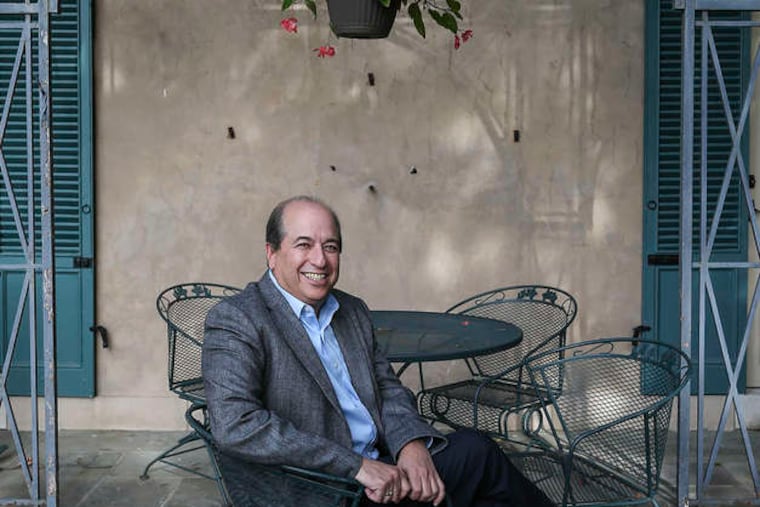Helping those with eating disorders
As a corporate lawyer for an expanding psychiatric hospital, Samuel E. Menaged built up expertise in developing and operating mental health facilities - the permits, the financing, the insurance reimbursements.

As a corporate lawyer for an expanding psychiatric hospital, Samuel E. Menaged built up expertise in developing and operating mental health facilities - the permits, the financing, the insurance reimbursements.
After Menaged's best friend, a therapist, kept telling Menaged he should use his expertise to open a treatment center for women with eating disorders, Menaged finally agreed. In 1984, he founded the Renfrew Center.
Now there are 16 locations and revenue totals $40 million. Next weekend, 500 specialists who treat eating disorders will be in Philadelphia to attend the Renfrew Center Foundation's annual conference.
For Menaged, 66, the world of eating disorders - primarily a female world - was largely unknown.
"I had no idea what an eating disorder was," Menaged said. "I went to Yale when it was all-male. I was one of four brothers. I grew up in an Orthodox Jewish household, where the women were separate. So this is something women told women, but guys didn't know anything about it."
Question: What have you learned about why women might starve themselves, or overeat, or binge eat, then purge by vomiting or using laxatives?
Answer: The amount of sexual abuse in this population is incredible. I don't want to say it's a majority. I have heard stories - I'm talking about pornography, abuse of women, being parts of cults. They've had miserable lives. I have 27 acres [at Renfrew in Philadelphia]. Six of them should be set aside as a cemetery for the men who have abused the women who are here. And I don't want to blame only men. But it's incredible . . . the travesties. It's almost sickening to realize the seamy side of life that I've seen.
Q: What's at the root of it?
A: Low self-esteem. People have been bullied, there's trauma, deaths in the family. The person has missed unconditional love. I'm so aware now of society's pressures on women.
Q: You're not a clinician, but do people ask you for advice?
A: I'm the life of the party. This sounds crazy, but - women gravitate to me. They all know somebody or they've all struggled with these issues.
Q: Was it hard to persuade banks to finance you and insurance companies to reimburse you for care?
A: Whenever I met women in any positions of power, they understood it. Although most people in Blue Cross were men in blue suits, there were women there that had influence. Right now, my bankers are all women.
Q: Do you deliberately seek to do business with women?
A: If I know there's a woman in a position in a company where I want to get some entry, whether it's insurance or banking or anything like that, I know I have a better chance of succeeding, because women understand this problem better than men.
Q: What's Renfrew's model?
A: We heal through relationships, by sharing with other people who have similar issues. We have programming for adolescents. We have a substance-abuse track. We have an Orthodox Jewish track. When we opened in Nashville, I had to cater to the Christian community.
Q: How so?
A: Well, [if you take] an Orthodox Jewish or a fundamentalist Christian woman and put her in a group where women are talking sexual experiences - it's not going to go. So we use that time to talk about the holiness of their bodies. You can open any Bible, there are [verses] about taking care of your body.
Q: How about your weight?
A: I would like to lose some weight. It's about eating healthy and not eating large portions. It's hard to do. I'm very healthy, though.
SAM MENAGED
Title: Founder, president, the Renfrew Center.
Home: Ardmore.
Family: Wife, Pamela; children, Rachel, 36; Vanessa, 33; Daniel, 29; Anna, 23.
Diplomas: Yale University, history; New York University, law.
Past life: Lawyer for musicians, including Teddy Pendergrass.
On vacation: Rarely checks in while visiting wife's family in Australia.
Dining out: Indian food - once a week.
EndText
THE RENFREW CENTER
Where: Philadelphia.
Business: Treatment of women with eating disorders, privately held, for-profit.
Centers: 16, including two residential facilities, one in Philadelphia.
Nearby: Philadelphia, Mount Laurel, Radnor.
Employees: 500.
Why Renfrew: Named after the initial property, a 27-acre farm once owned by an heiress to the Pennsylvania Railroad fortune.
Biggest challenge: Ever-less-generous insurance reimbursements.EndText
MORE ONLINE
Sam Menaged on battling insurers for patient care. www.inquirer.com/jobbing.EndText